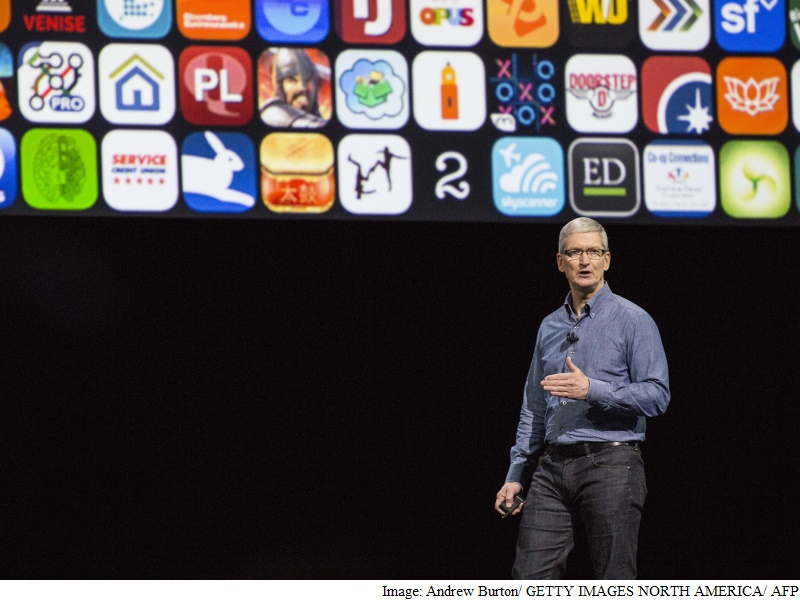- Home
- Mobiles
- Mobiles Features
- Apple's Announcement on Artificial Intelligence Is a Big Shift for the Company
Apple's Announcement on Artificial Intelligence Is a Big Shift for the Company

Apple's sweeping new artificial intelligence play takes a page from features introduced by rival tech companies in recent years - but adds the polished, user-friendly twist that consumers have come to expect from the electronics giant.
At the company's annual developer's conference in San Francisco on Monday, Apple executives announced a raft of features in the company's soon-to-be released desktop and mobile operating systems that are powered by artificial intelligence - the blend of powerful computing capabilities and software algorithms. Such technology can make the phone or other device appear smarter because it anticipates the types of activities people want to do. Apple also said it was opening up many applications to outside developers, including its messaging platform iMessage, Maps, and virtual assistant Siri - a departure for the company, which in the past has kept these systems tightly controlled.
(Also see: WWDC 2016: Highlights From Apple's Keynote Address)
For Apple, more AI and more integrations with third party services will mean less fatigue for consumers, who are already overwhelmed with too many apps, too many devices, and too much data. Ultimately, artificial intelligence behind-the-scenes could make it easier for users to organize their ever-growing photo collections, communicate and use online services more efficiently, and toggle less between devices. The moves also come at a time when tech giants and a wave of new startups are racing to create similar artificial-intelligence based products.
For example, Apple will now scan your photos using facial recognition to cluster people together in your photo collection. If pictures of grandpa are scattered across your photo collection, Apple will now find them using facial recognition and group them together so you can organize your memories without having to sift on your own. Facebook has had automatic facial recognition for several years. This stuff isn't simple: Behind the scenes, the software is doing 11 billion computations on each photo to make this happen, Apple said.
Apple's other AI announcements borrowed heavily from Cortana, Microsoft's voice-based virtual assistant that works in Windows. Executives said that Siri is now coming to desktop computers - soon consumers will be able to talk to your Mac computer just the way that you talk to your phone.
Overall, more consumers are talking to technology: Google recently said that roughly 20% of all queries are initiated by voice rather than typing. While Cortana has enabled users to talk to their desktops for over a year, Apple has the advantage of being able to integrate a popular tool on mobile onto desktop, making the experience of moving between devices more seamless. Like Cortana, Siri will also now scan people's communications and make suggestions. If the system sees two people discussing a meeting over text message, a calendar icon will pop up, enabling the users to schedule the meeting from within their texting thread.
In opening major applications to third parties, Apple is nodding to a growing view in Silicon Valley that consumers are seeking an alternative to toggling between the dizzying number of apps they store on their phones.
In addition to building Siri into the desktop, the changes will allow developers to supercharge their apps with Siri's voice. User will soon be able to use Slack, Uber, or Skype, by talking directly to Siri. This widely anticipated move takes a page from Amazon. The company's Alexa voice service on its popular Echo smart home assistant device, has been allowing third party to build services onto its platform -- for some time now, consumers have been able to ask Alexa to read out the weather, or connect to smart locks.
Apple is also trying to reduce app fatigue by enabling consumers to do more within a single application. Want to call an Uber without leaving your text message conversation? You can do that within iMessage. The company is also attempting to relieve some password fatigue by letting you log on to your computer with your Apple Watch, so you don't have to type another password. And Apple Pay will be expanded too, so that it now works on your desktop on a number of e-commerce sites. That means consumers who prefer to use Apple can avoid painstakingly entering and storing their credit card info with a slew of vendors.
Opening up its platforms to third parties has also historically been a point of discomfort for Apple, as the company's impulse to control the quality and integrity of its own products has butt up against major trends in AI. The original Siri included integrations with many third parties that were dissolved after Apple bought the Siri startup five years ago. Today, against a wave of outside pressures, Apple just about came full circle.
© 2016 The Washington Post
Get your daily dose of tech news, reviews, and insights, in under 80 characters on Gadgets 360 Turbo. Connect with fellow tech lovers on our Forum. Follow us on X, Facebook, WhatsApp, Threads and Google News for instant updates. Catch all the action on our YouTube channel.
Related Stories
- Samsung Galaxy Unpacked 2026
- iPhone 17 Pro Max
- ChatGPT
- iOS 26
- Laptop Under 50000
- Smartwatch Under 10000
- Apple Vision Pro
- Oneplus 12
- OnePlus Nord CE 3 Lite 5G
- iPhone 13
- Xiaomi 14 Pro
- Oppo Find N3
- Tecno Spark Go (2023)
- Realme V30
- Best Phones Under 25000
- Samsung Galaxy S24 Series
- Cryptocurrency
- iQoo 12
- Samsung Galaxy S24 Ultra
- Giottus
- Samsung Galaxy Z Flip 5
- Apple 'Scary Fast'
- Housefull 5
- GoPro Hero 12 Black Review
- Invincible Season 2
- JioGlass
- HD Ready TV
- Latest Mobile Phones
- Compare Phones
- Leica Leitzphone
- Samsung Galaxy S26+
- Samsung Galaxy S26 Ultra
- Samsung Galaxy S26
- iQOO 15R
- Realme P4 Lite
- Vivo V70
- Vivo V70 Elite
- Asus TUF Gaming A14 (2026)
- Asus ProArt GoPro Edition
- Huawei MatePad Mini
- Infinix Xpad 30E
- Huawei Watch GT Runner 2
- Amazfit Active 3 Premium
- Xiaomi QLED TV X Pro 75
- Haier H5E Series
- Asus ROG Ally
- Nintendo Switch Lite
- Haier 1.6 Ton 5 Star Inverter Split AC (HSU19G-MZAID5BN-INV)
- Haier 1.6 Ton 5 Star Inverter Split AC (HSU19G-MZAIM5BN-INV)

















